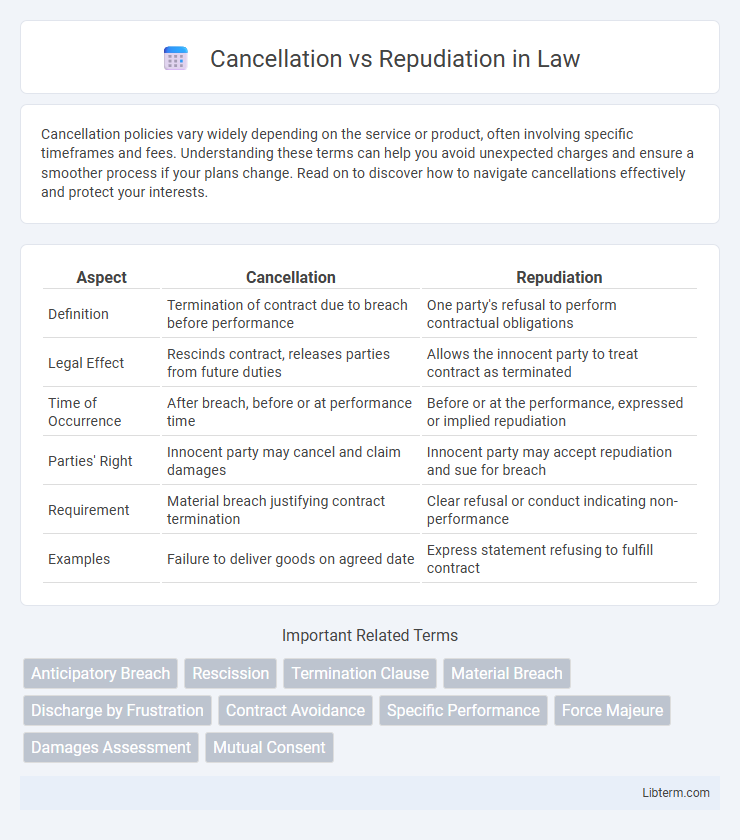Cancellation policies vary widely depending on the service or product, often involving specific timeframes and fees. Understanding these terms can help you avoid unexpected charges and ensure a smoother process if your plans change. Read on to discover how to navigate cancellations effectively and protect your interests.
Table of Comparison
| Aspect | Cancellation | Repudiation |
|---|---|---|
| Definition | Termination of contract due to breach before performance | One party's refusal to perform contractual obligations |
| Legal Effect | Rescinds contract, releases parties from future duties | Allows the innocent party to treat contract as terminated |
| Time of Occurrence | After breach, before or at performance time | Before or at the performance, expressed or implied repudiation |
| Parties' Right | Innocent party may cancel and claim damages | Innocent party may accept repudiation and sue for breach |
| Requirement | Material breach justifying contract termination | Clear refusal or conduct indicating non-performance |
| Examples | Failure to deliver goods on agreed date | Express statement refusing to fulfill contract |
Understanding Cancellation and Repudiation
Cancellation refers to the termination of a contract due to breach or mutual agreement, effectively releasing parties from further obligations. Repudiation occurs when one party clearly indicates an unwillingness or inability to perform contractual duties, allowing the other party to accept the breach and seek remedies. Understanding the distinction between cancellation and repudiation is crucial for enforcing contractual rights and determining appropriate legal consequences.
Legal Definitions and Key Differences
Cancellation refers to the annulment of a contract, rendering it void from the outset due to factors like misrepresentation or mutual agreement, while repudiation occurs when one party refuses to honor contractual obligations, indicating an intention to breach the contract. Legally, cancellation voids the contract ab initio, relieving both parties from future performance, whereas repudiation allows the non-breaching party to either accept the breach and terminate the contract or affirm the contract and seek performance. Key differences include timing and effect: cancellation nullifies the contract immediately, whereas repudiation arises from a party's conduct indicating refusal to perform, enabling remedies such as damages or termination.
How Cancellation Works in Contract Law
Cancellation in contract law occurs when one party formally declares a contract void due to a breach or failure of consideration, effectively terminating contractual obligations without the need for further performance. The party seeking cancellation must provide clear notice to the other party, demonstrating that the breach is substantial and justifies ending the agreement. This remedy restores parties to their pre-contractual position, often involving restitution to reverse any benefits exchanged.
The Concept of Repudiation Explained
Repudiation occurs when one party unequivocally refuses to fulfill their contractual obligations, indicating an intention to breach the contract. This contrasts with cancellation, which terminates the contract due to breach or mutual agreement without implying outright rejection. The concept of repudiation is central in contract law as it allows the non-breaching party to treat the contract as discharged and seek damages or remedies.
Grounds for Contract Cancellation
Grounds for contract cancellation typically include mutual mistake, misrepresentation, fraud, undue influence, duress, and lack of consideration, which render the contract voidable and allow the aggrieved party to rescind the agreement. Repudiation occurs when one party demonstrates an intention not to perform their contractual obligations, constituting an anticipatory breach that entitles the non-breaching party to terminate the contract and seek damages. Unlike cancellation, repudiation is based on conduct indicating refusal or inability to perform, leading to an immediate right to treat the contract as discharged.
Common Reasons for Repudiation
Repudiation often occurs due to breaches such as non-performance, refusal to fulfill contractual obligations, or actions indicating unwillingness to perform. Common reasons for repudiation include failure to deliver goods or services, incorrect delivery, or repudiating the contract terms outright. Unlike cancellation, which is a formal termination process, repudiation signifies a fundamental breach allowing the innocent party to seek remedies.
Legal Consequences: Cancellation vs Repudiation
Cancellation terminates a contract due to breach, releasing both parties from future obligations but often preserving rights to damages for prior breaches. Repudiation occurs when one party clearly indicates an intention to not perform, allowing the innocent party to accept the repudiation and treat the contract as ended, also seeking damages. Both legal concepts impact contractual relationships, but cancellation emphasizes contract termination following breach, while repudiation centers on anticipatory breach and the innocent party's response options.
Remedies Available to Aggrieved Parties
Cancellation allows aggrieved parties to void contracts and seek restitution, restoring them to their original positions before the agreement. Repudiation permits the innocent party to accept the breach, terminate the contract, and claim damages for losses incurred. Courts often grant specific performance, damages, or rescission depending on whether the issue is cancellation or repudiation.
Real-World Examples and Case Studies
Cancellation occurs when a party formally nullifies a contract due to breach or impossibility, exemplified by the cancellation of airline tickets following natural disasters. Repudiation involves one party indicating an unwillingness or inability to perform contractual obligations, as seen in the case of a supplier refusing to deliver goods, leading to a lawsuit for breach of contract. Real-world cases such as Hadley v Baxendale illustrate repudiation consequences, while cancellation is common in service agreements disrupted by unforeseen events.
Choosing the Right Course: Cancellation or Repudiation
Choosing between cancellation and repudiation depends on the contract terms and the nature of the breach. Cancellation terminates the contract and releases both parties from future obligations, typically invoked when the breach is fundamental. Repudiation involves one party indicating an unwillingness or inability to perform, allowing the non-breaching party to accept this and treat the contract as breached, often leading to damages or termination.
Cancellation Infographic

 libterm.com
libterm.com